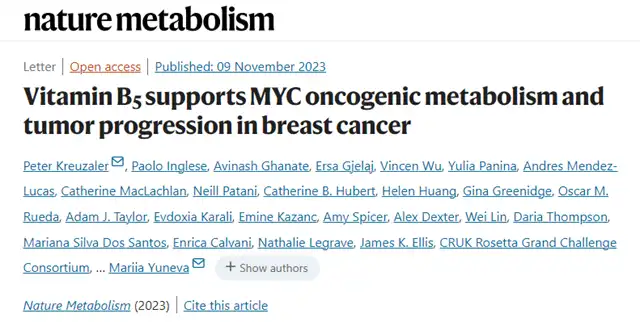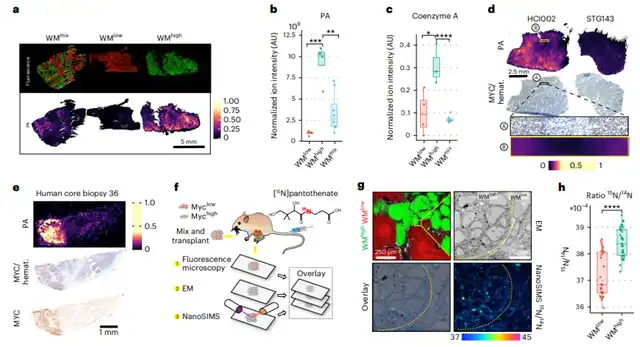This Common Vitamin Linked to Cancer Growth
- Normal Liver Cells Found to Promote Cancer Metastasis to the Liver
- Nearly 80% Complete Remission: Breakthrough in ADC Anti-Tumor Treatment
- Vaccination Against Common Diseases May Prevent Dementia!
- New Alzheimer’s Disease (AD) Diagnosis and Staging Criteria
- Breakthrough in Alzheimer’s Disease: New Nasal Spray Halts Cognitive Decline by Targeting Toxic Protein
- Can the Tap Water at the Paris Olympics be Drunk Directly?
This Common Vitamin Linked to Cancer Growth, Dietary Restriction Shows Potential Inhibition
- Should China be held legally responsible for the US’s $18 trillion COVID losses?
- CT Radiation Exposure Linked to Blood Cancer in Children and Adolescents
- FDA has mandated a top-level black box warning for all marketed CAR-T therapies
- Can people with high blood pressure eat peanuts?
- What is the difference between dopamine and dobutamine?
- How long can the patient live after heart stent surgery?
This Common Vitamin Linked to Cancer Growth, Dietary Restriction Shows Potential Inhibition
Vitamin B5, also known as pantothenic acid, plays a role in promoting MYC oncogenic metabolism in breast cancer, according to a study by researchers at the Francis Crick Institute, UK.
In a breakthrough discovery published in the journal “Nature Metabolism,” researchers from the Francis Crick Institute in the UK revealed a significant association between Vitamin B5 and the growth of breast cancer cells expressing high levels of MYC, an oncogene associated with various biological processes.
Vitamin B5, essential for several metabolic processes and energy production, is commonly obtained through a balanced diet, and deficiencies are relatively rare.
Breast cancer, the most prevalent cancer in women, has seen a rapid increase in new cases globally, overtaking lung cancer as the leading global cancer, with 2.26 million new cases reported in 2020, according to data from the International Agency for Research on Cancer.
Tumors, including breast cancer, exhibit clonal heterogeneity, promoting their evolution but hindering treatment. The tumor microenvironment undergoes constant changes, characterized by fluctuations in oxygen and nutrient supply.
MYC, an oncogene encoding the MYC protein, plays a crucial role in various biological processes such as cell growth, differentiation, apoptosis, and metabolism. Overexpression of MYC promotes cell proliferation and growth while inhibiting apoptosis, leading to tumor formation, often dependent on specific nutrients.
On November 9, 2023, researchers at the Francis Crick Institute published a study titled “Vitamin B5 supports MYC oncogenic metabolism and tumor progression in breast cancer” in the journal “Nature Metabolism.”
The study demonstrated that breast cancer cells with high MYC expression in both human and mouse models heavily rely on Vitamin B5 for growth and survival. Dietary restriction of Vitamin B5 intake reversed many MYC-mediated metabolic changes, inhibiting tumor growth.

In the study, researchers created tumors in mice using two types of cells with varying levels of MYC expression and transplanted human breast cancer tissue into mice, including areas with high and low MYC expression.
Mass spectrometry imaging analysis revealed a correlation between Vitamin B5 and areas with high MYC expression in both mouse and human transplanted breast cancer tissues.
Importantly, the researchers observed this correlation in biopsies from breast cancer patients.

Vitamin B5 correlates with MYC expression in breast cancer
Further investigation showed an increase in the quantity of various Vitamin B5 transport proteins, such as SLC5A6, in areas with high MYC expression, facilitating more Vitamin B5 entry into cells and promoting tumor cell growth.
The researchers believe that the association between Vitamin B5 and tumor cell growth is due to the crucial role of Vitamin B5 in metabolism. Once inside the cell, Vitamin B5 is converted into coenzyme A, participating in many metabolic pathways, ultimately leading to increased energy, fat, and protein production, promoting cell growth.

Restricting vitamin B5 intake reduces tumor growth
Interestingly, when mice were fed a diet lacking Vitamin B5, tumor growth in both high and low MYC expression regions was slower compared to mice on a standard diet. This trend was also observed in human breast cancer tissue transplanted into mice, suggesting a key role for Vitamin B5 in tumor metabolism and growth.
The researchers caution that while limiting Vitamin B5 intake may inhibit tumor growth, considering the crucial role of Vitamin B5 in the immune system, caution is needed when restricting Vitamin B5 intake in breast cancer patients. Currently, researchers are exploring methods to selectively target tumors without compromising the immune system.
The study’s findings indicate a significant dependence of breast cancer cells with high MYC expression on Vitamin B5 for growth and survival. Dietary restriction of Vitamin B5 intake shows potential as a therapeutic target, highlighting the importance of understanding tumor metabolic dependence for the development of effective cancer treatments.
For more information, you can access the full paper here.
Vitamin B5 correlates with MYC expression in breast cancer
(source:internet, reference only)
Disclaimer of medicaltrend.org
Important Note: The information provided is for informational purposes only and should not be considered as medical advice.



